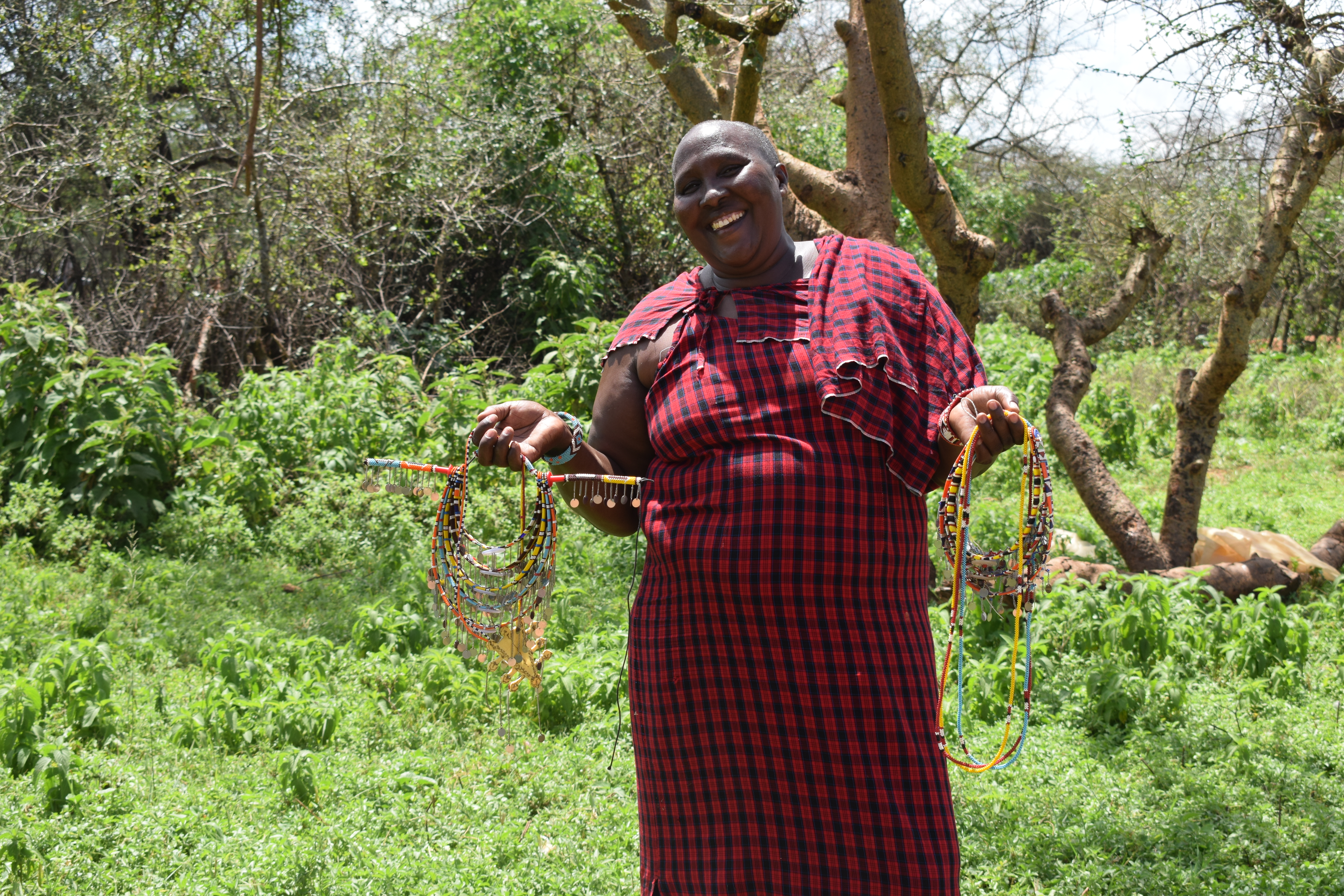Specifics
- Branch Name: Kajiado
- Geography: Rural
- Client Name: Lilae Roika
- Business: Crop and livestock farming, handcrafting beaded bracelet/clothes
Lilae's farming venture
Lilae Roika, 51, is a seasoned farmer who is also skilled in handcrafting beaded jewelry and clothing living in Ngatu Village, Kajiado. She is blessed with six children whom she proudly speaks of. Lilae has pastoral duties at the village church with two hundred plus congregants where she preaches every Sunday. As the second wife, in accordance with Maasai matrimonial traditions, she resides independently from her husband on a four-acre plot of land that was allocated to her following their marriage. Lilae has maximized the use of the four-acre space by farming different crops including maize, beans, potatoes, and bananas both for home consumption and for sale. She also keeps different animals including cows, goats, sheep and chicken in this space. With generational skills of hand making beaded bracelets and clothing, she enjoys spending most of her free/break times making the finest Maasai bracelets and clothing which she sells through her shop in the village market. Lilae has employed four people to help her run the big farm.

Inspiration behind venturing into farming which is outside the Maasai culture,
We were curious to know why Lilae had embraced farming as a business instead of dwelling on livestock keeping, a tradition kept by the Maa community which Lilae comes from. Her response:
“I went to a border school called Olelogun Primary where I met a friend from the Kamba community. She used to invite me to her home for lunch as my home was far from school compared to hers. I encountered for the first time a meal that I had never tasted before known as ‘Githeri’, boiled mixture of maize and beans, which I found tasty and filling. Back home, we were only used to cow milk and meat. I could not hold the urge to taste the meal again and again, so I shared this news with my mother who decided to visit the parents of my friends learn about this meal that she had never heard of before. With guidance from my friend’s parents, my mother instantly started farming maize and beans. I was always in the farm with my mother lending a hand and at the same time learning from how she was preparing the land, planting, maintaining and harvesting the produces-from this young age, I fell in love with farming and I am always looking for opportunities of diversifying. Today, I happily run this four-acre farm owing to what I learnt from my friend in primary school and my mother. Selling the produces from this farm has enabled me finance all my children’s education. I am proud to see all my children receiving university education which I did not manage to receive during my younger years.”
"Selling the produces from this farm has enabled me finance all my children’s education. I am proud to see all my children receiving university education which I did not manage to receive during my younger years.”
Joining ASA,
“I learnt about ASA in October 2018 through a business friend and joined one of its women groups in Kajiado town where I used to operate my beaded bracelet shop then. I took a first loan of KES. 20,000/- on 18th October 2018 to increase my bead and cloth stock. In 2020, I moved my beaded bracelet shop to my Ngatu village, which is 70 kilometers from Kajiado town to be close to my farm. I shared the idea of borrowing from ASA to my neighbors at Ngatu village, who from some past bad experiences with other lending institutions did not easily trust establishing a funding relationship with ASA. With the help of a Client Officer or as they are known, ‘teacher/mwalimu’ we convinced to start our own group at the village. We called our group Namunyak, meaning blessing with me as the chairlady. For the last two years, we have influenced more than eighty women to join our group to access funding from ASA and we enjoyed borrowing our business capital from ASA as they are very responsible with us and our finances. I am at the eleventh cycle of borrowing with a current loan of KES. 120,000/- which I used to purchase water pipes and pesticide for my farm. Through Namunyak group, we encourage each other to be hard working in our various businesses and to help each other during challenging times. We have not had one woman failing to repay her loan, and it’s down to the highest form of discipline we demand of ourselves. We also run our own ‘Chama/merry-go-round’ where we save and give members lump sum amount of money for their own spending.”
"For the last two years, we have influenced more than eighty women to join our group to access funding from ASA and we enjoyed borrowing our business capital from ASA as they are very responsible with us and our finances. "
Challenges experienced in the business,
- “Managing through the drought season is my biggest challenge. We did not experience rainfall between 2020 and 2022, and this affected our lives harshly. I lost over 100 cattle during this period. As you can see, I only have 50 cattle now who survived the long drought narrowly. We had to walk our herd of over 150 cattle hundreds of kilometers in search of pasture and water in 2021 when the rains completely failed. From here, we walked, to Maparasha, to Kilomito, to Suswa, which is over 200 kilometers away, spending over six months away from our home. When we decided to come back home, we had lost over 100 cattle to the harsh conditions-this was so heartbreaking. But, we have never given up-see, God has blessed us with the rains now and it is all green. Look at my herd now roaming around without stress.”
- “When the harvest season approaches, my farm is occasionally visited by baboons in search of food, particularly the maize. Whenever they visit, they trump on and destroy other crops on the ground like beans and potatoes. With the assist of two boys whom I am mentoring, we have to wake up at 5.00 a.m. during such seasons to guard the farm from these destructive baboons. The boys guard the farm during the day. I have communicated this to the Kenya Wildlife Services but no help has come yet.”
How she plans to overcome her current and future challenges,
“Harsh climate conditions have left me and my community with huge economic loss. Because of this, I have grown grass in large quantity which I intend to harvest, dry and store properly for future use in case of failed rain. When I harvest my maize, I intend to chop and store the stalks as fodder for the cows. I intend to purchase a bigger capacity generator to pump huge amounts of water from the Olkeriai River to the storage facilities in my farm.”
What satisfies you most?
“As a church leader and the chairlady of about eighty women entrepreneurs in my community, I find it most satisfying when I see my congregants and the women I lead thrive within their families. I like to see women engaging themselves in income generating opportunities and I enjoy supporting them whenever and however I can. Whenever I get the chance to teach or share my experience and advise, I remind them that the society depends on our capacity and skills to bring joy to our homes-I tell them to find examples in women from other communities who have embraced working and not just sitting at home waiting for the husbands to provide food, money or any other basic needs.”
" I like to see women engaging themselves in income generating opportunities and I enjoy supporting them whenever and however I can. Whenever I get the chance to teach or share my experience and advise, I remind them that the society depends on our capacity and skills to bring joy to our homes"
